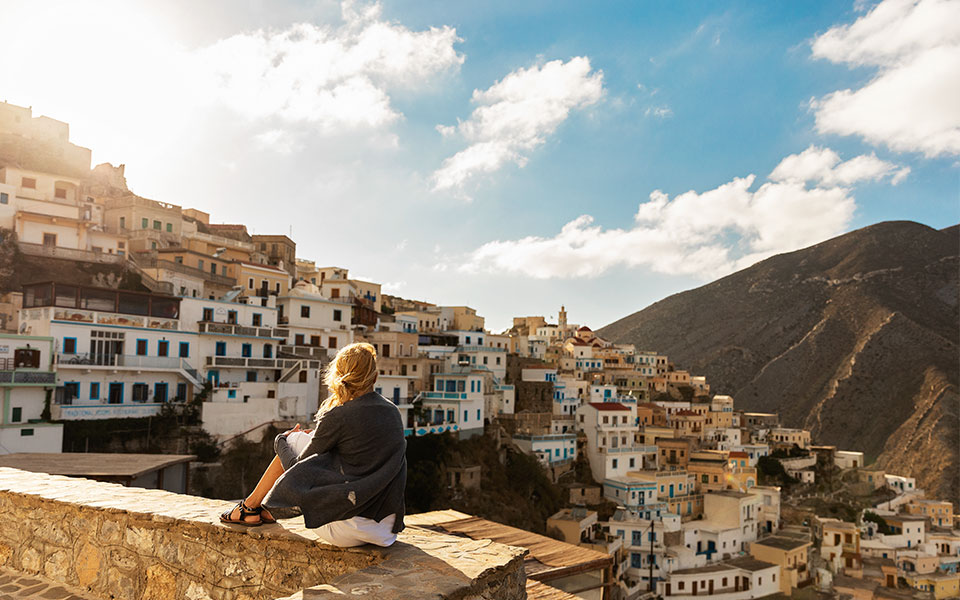EXPLORE KARPATHOS
CENTURIES SIDE BY SIDE: In just three stops, you can traverse the entire history of Karpathos. At Pigadia, the island’s main harbor, the Archaeological Museum of Karpathos (Tue-Sun 9:00-14:00) is housed in the 1935 art deco building that was the provincial headquarters under Italian rule. It holds exhibits from the Neolithic to the Byzantine periods. In Arkasa, on the western side of the island, the ancient altar at the center of the church of Aghia Sofia (5th c.) is used today as a baptismal font. From there, a ten-minute walk will take you to Paliokastro, the ancient city of Arkasa, where Mycenaean walls and columns from the Classical and Hellenistic periods stand side by side.
Info
- Area: 302 sq. km.
- Population: 7,310 (2011 census)
- Distance: 242 (Sea miles from Piraeus)
- Highest Peak: 1220m (Mt Lastos)
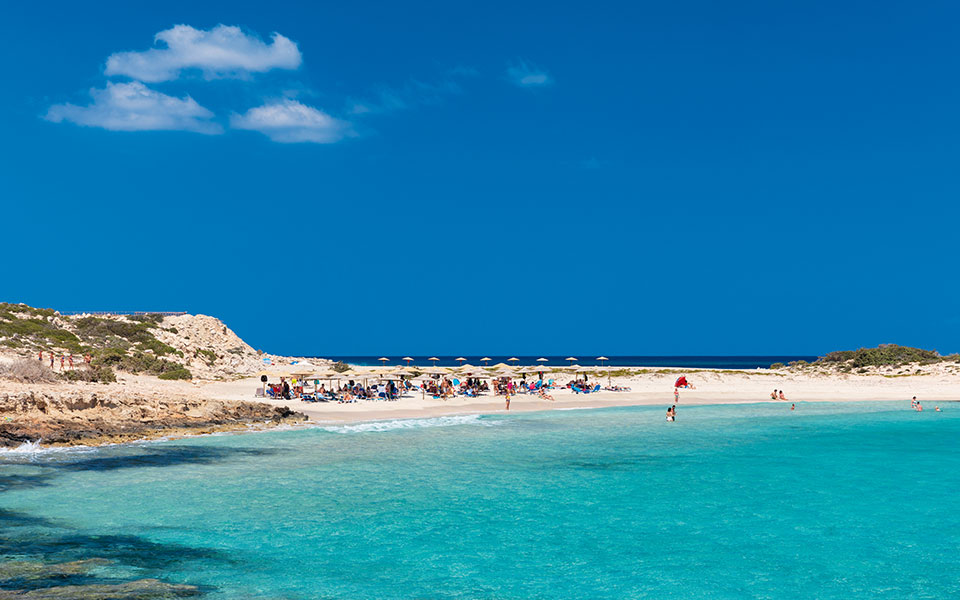
© Nicholas Mastoras
TIME CAPSULE: In the high season, try and get to Olympos before 11:00 or after 17:30, to avoid the crowds. Wandering around the village, you’ll see women working their looms, local artist Popi Pavlidou painting her ceramic plates, or the last of the traditional cobblers, Yiannis Prearis at work on a pair of stivania (boots). If you’re on the island from August 28 to 30, make sure to attend the panigyri (traditional feast) of Vroukounda – no other one in Greece is quite like it. It takes place outside a remote chapel nestled in a cave right by the sea. You can get there by taking a fishing boat from Diafani or by walking from Avlona. The local women arrive late in the afternoon, leading donkeys laden with supplies for the feast and blankets for the night ahead. No one sleeps though, as the revelries, which take place against the backdrop of the ancient necropolis illuminated with candles, last all night and the sun rises to the sound of the lyra and the tsabouna (bagpipe). On the second and third day, the festivities move on to Avlona.
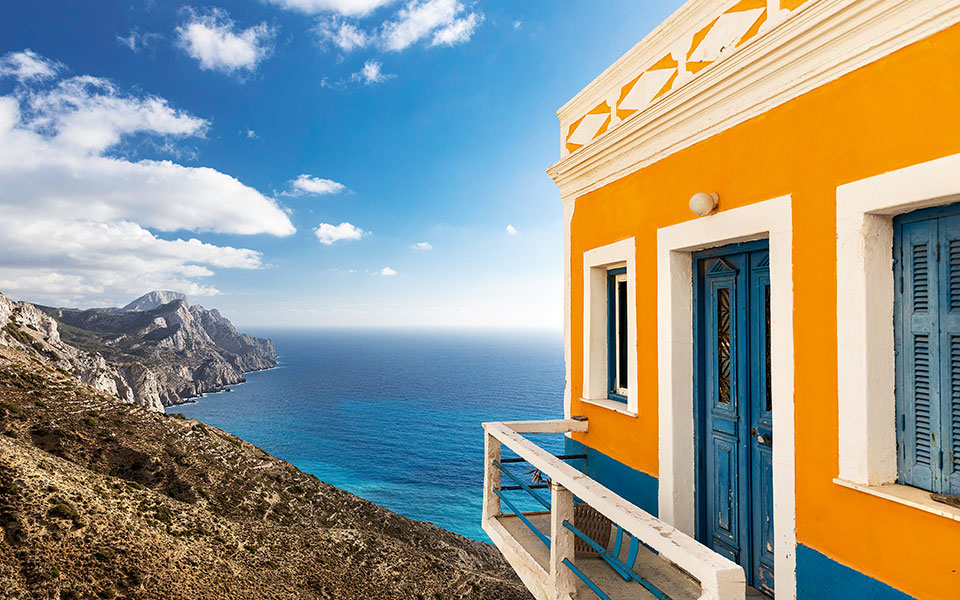
© Nicholas Mastoras
VILLAGE HOPPING: The elegant village of Aperi is home to grand mansions. Built by renowned local craftsmen, most of these have been renovated and their owners, who live abroad, use them every summer. At Menetes, a colorful village in the south, it’s worth going up to the Church of the Dormition (1845), with its spectacular iconostasis and the panoramic view from its courtyard. In order to explore tranquil Mesochori (“middle village”), you’ll have to go up and down alleys and steps and cut through courtyards. Cool down with a drink of water from the three springs of Panaghia Vrysiani (1553) and sit at Skopi Café, where the owner maintains his own old-school database of customers – since 1996, 11,600 visitors have scrawled their names everywhere, from the pergolas to the chairs.
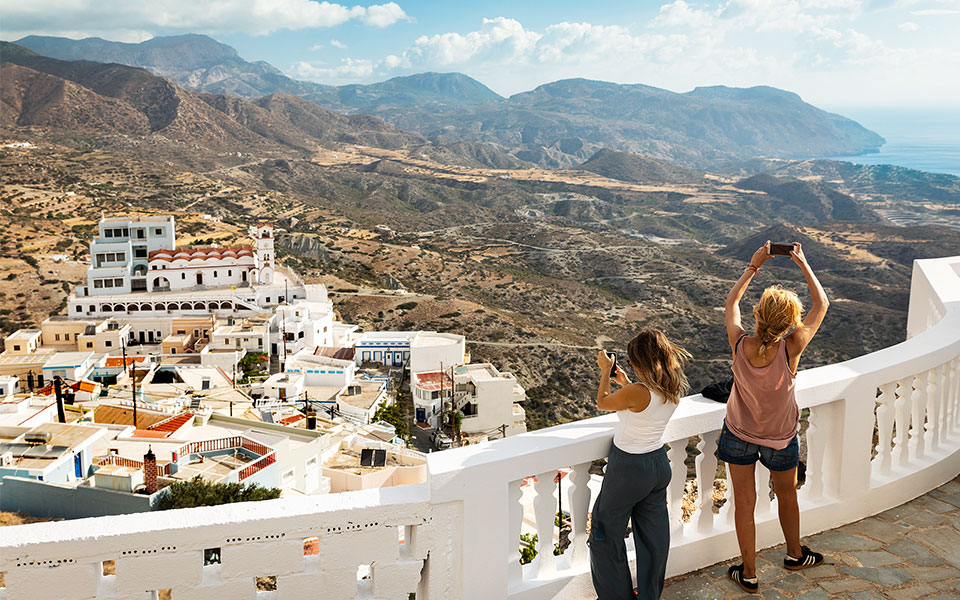
© Nicholas Mastoras
AS IN THE OLD TIMES: You can find out about the older way of life on the island at a number of small museums. The Agricultural Museum in Pyles (daily 10:00-13:00 and 18:00-20:00), with its own little farm with chickens and goats, includes exact replicas of a period farmhouse, a wine press and a dairy, as well as a fully operational windmill and a wood-fired oven that produces traditional onion biscuits. The Folk Museum in the village of Othos (Mon-Sat 10:00-13:30) features the interior of a Karpathiot home with examples of intricate needlework, icons, tableware and elaborate sofas and a raised sleeping platform. In the same neighborhood, in the Workshop Gallery (open 9:00-14:00 & 17:00-21:00), you can see George Kostetsos through clouds of sawdust as he creates wooden sculptures and the traditional lyras of Karpathos. The Folk Museum of Menetes displays agricultural tools as well as a handmade, 300-year old kilimi (woven carpet). Open daily 9:00-13:00; the custodian, Eirini Rozaki, will also open up by appointment. (Tel. +30 6907.346.445.)
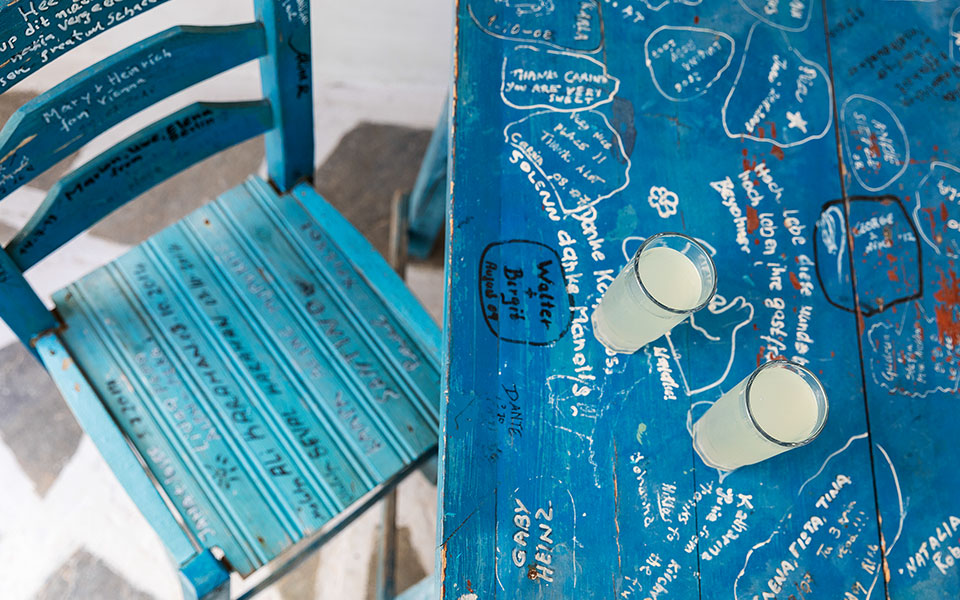
© Nicholas Mastoras
INTO THE WILD: Both fans of outdoor activities and history lovers have good reasons to visit the island of Saria, which lies north of Karpathos. With an area of 21 sq.km, it is the site of an ancient city named Nisyros and you can still see the remains of ancient fortifications and two abandoned settlements – one of which was home to Saracen pirates – as well as six chapels. The main natural attraction, ideal for a fascinating 40-minute hike, is the spectacular Edi, a gorge inhabited by rare birds of prey, such as long-legged buzzards and Eleonora’s falcons. Other residents of the island include the Mediterranean monk seal, which breeds in sea caves and approximately 2,500 goats! For the best view on Saria, head for the chapel of Aghios Zacharias, a 20-minute walk from the abandoned settlement of Argos, at the end of the Edi gorge. If you come by private boat, instead of the tourist caique, an extra bonus available to you is the secluded white-pebbled Maeria Beach.
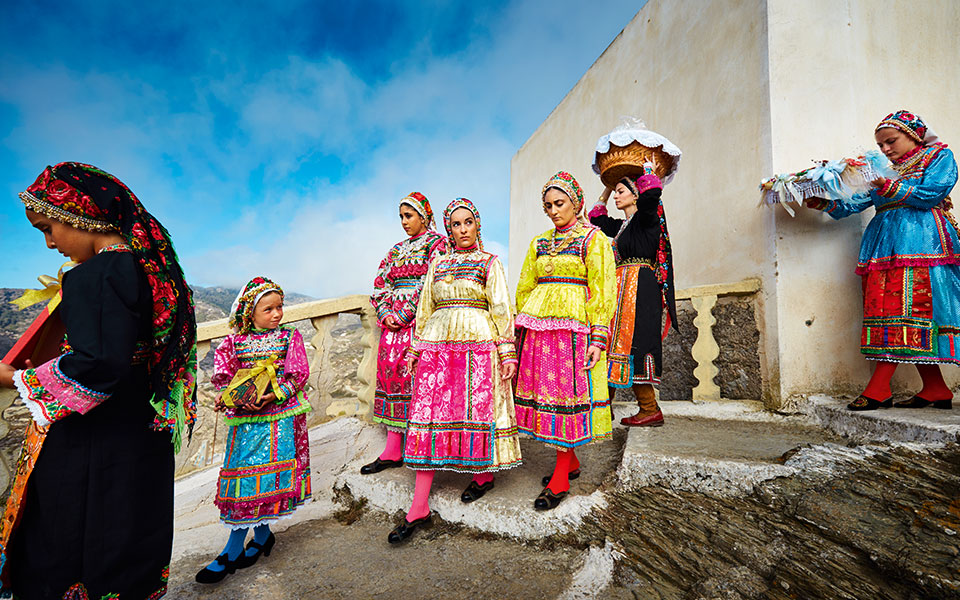
© George Tsafos
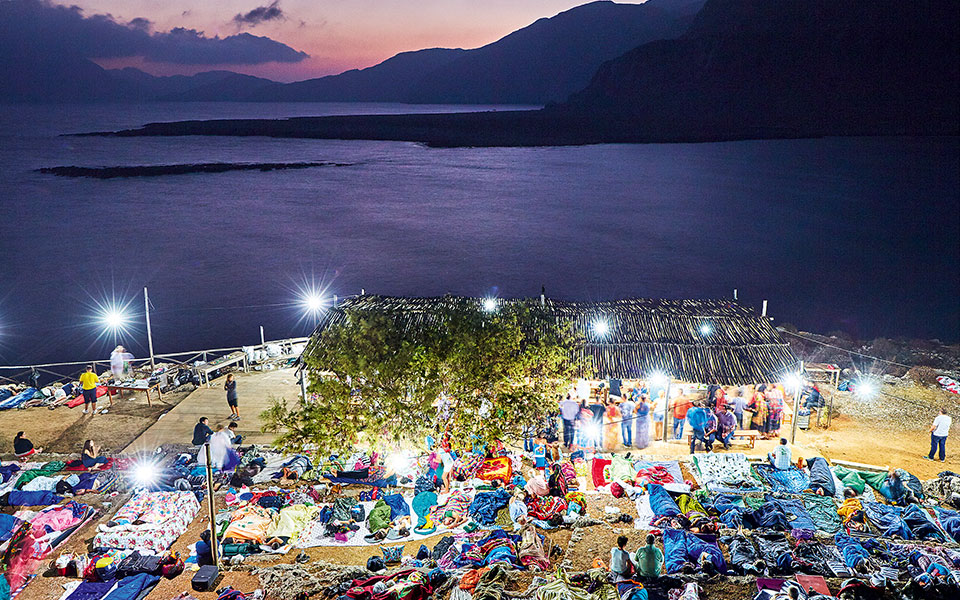
© George Tsafos
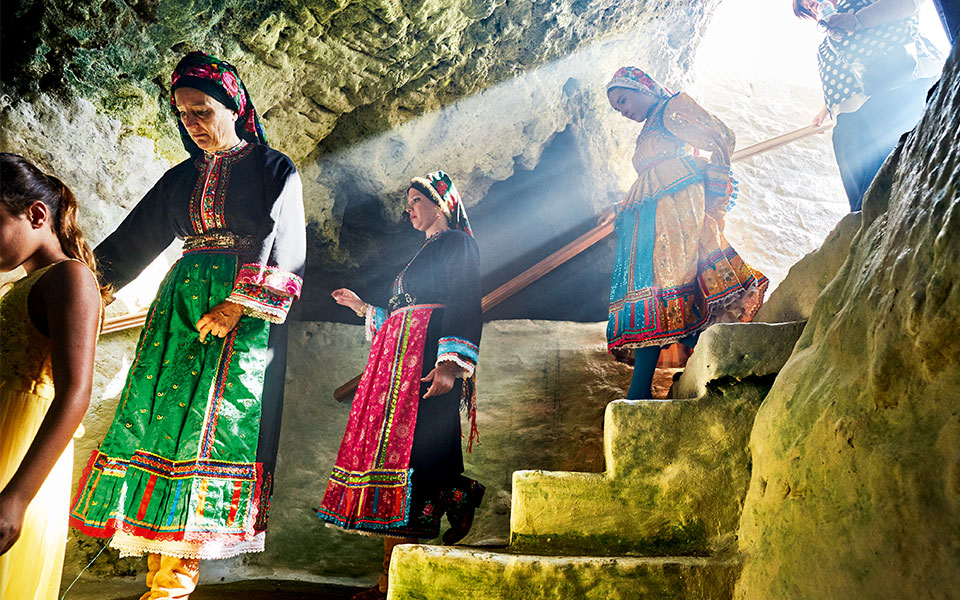
© George Tsafos
FOCUS – THE COLORFUL MYSTERY OF OLYMPOS
Due to its remote mountainous location, Olympos remained a closed society for centuries, with electricity and road access available only since the late ‘70s. In the past, it was a matriarchal society, with its own Doric dialect and unwritten laws that still apply, such as the one stipulating that the firstborn son and the firstborn daughter inherit the entire property of the father and mother respectively. Its opening up to the outside world has brought tourism and blunted the differences somewhat, but it still feels like a living folk museum. Women wear traditional clothing – those of the older generation do so every day – and the village has local traditions for every event, including weddings and births. For instance, a week after a child is born, its guardian saint is selected in a charming ancient version of a baby shower. The festivals here follow their own customs and offer amazing memories. They all start with slow songs performed by seated singers, then gradually a solemn dance begins and before long everyone’s on their feet. Often these festivities turn into lively processions, called patinades, through the streets of the village.
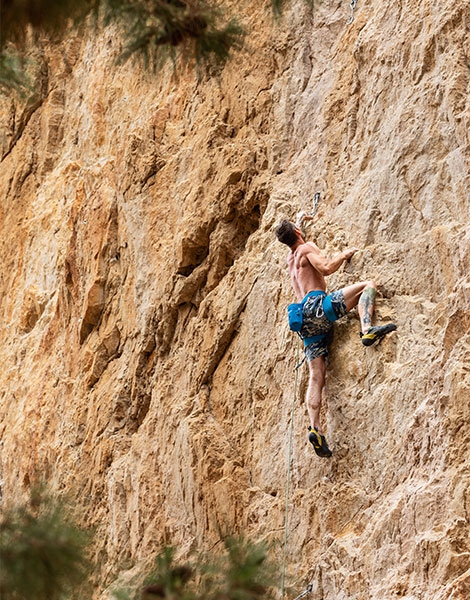
© Nicholas Mastoras
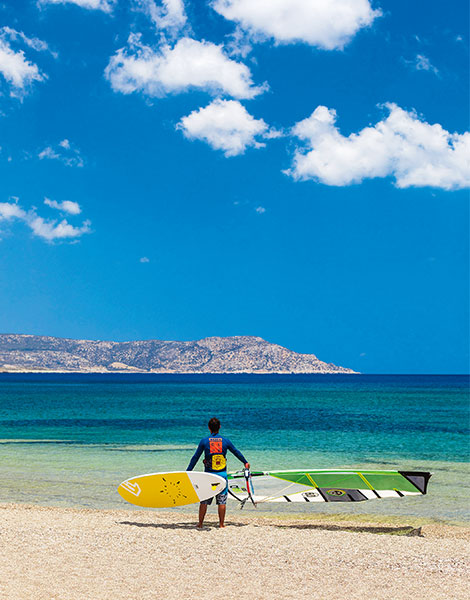
© Nicholas Mastoras
EXPERIENCE
ROCK CLIMBING: Over the recent years, Karpathos has become a rock climbing destination. There are more than 150 sites, mostly in the interior and southern part of the island. A popular spot is the 500m-long Flaskia Gorge that starts near the beach of Adeia and features 108 routes. Visit www.climbkarpathos.com for more information. If you’re a beginner, Anna Hristova at the ION Club (Tel. +30 6989.805.142) will show you the ropes.
HIKING: One of the most beautiful intermediate-level trails is the northbound route between Avlona and Tristomo (3h 20min). You’ll cross a wildlife preservation area to reach a fjord-like bay. On this hike, you’ll see the little chapel of Aghios Nikolaos, built on a pier jutting out over the water, and the ruins of the kazarmas (from the Italian caserma), the Italian barracks at Tristomo. You’ll also get a view of the 150m gap separating Karpathos and Saria, For an additional 22 trails, download the comprehensive Karpathian Paths app.
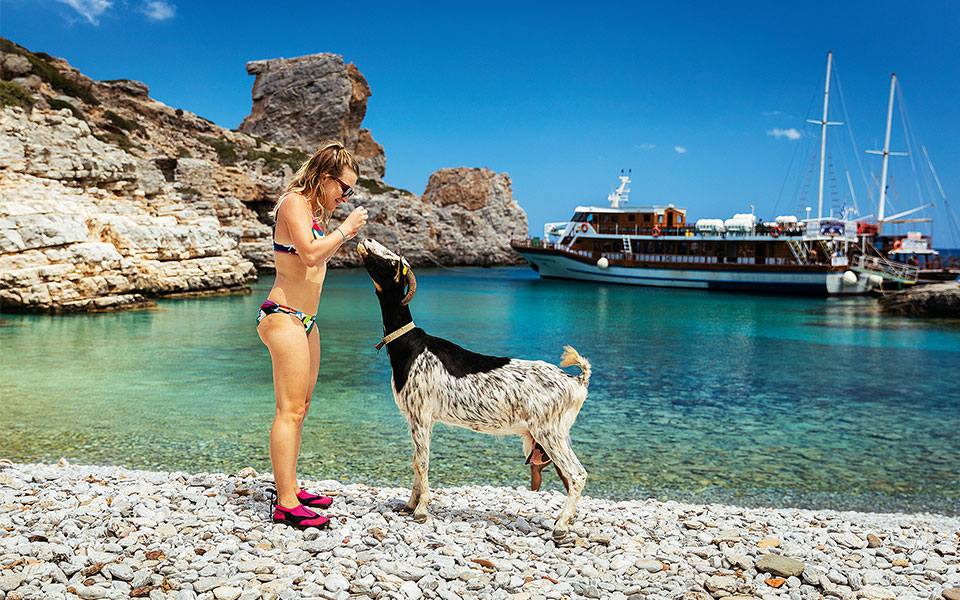
© Nicholas Mastoras
BEACHES AND SWIMMING: Karpathos has more than 100 beaches. Set your alarm clock early to beat the crowds to the famous Apella Beach, on the east coast, with white sand, emerald waters and pine trees and beach umbrellas for shade. If you do get there late and it’s already crowded, head a short distance south to Mikri Apella, where bathing suits are optional. Further south are the beaches of Kyra Panaghia and Achata, both with sun loungers and places to eat. At the southern part of the island, a 15-minute dirt road takes you to Diakoftis, an exotic beach with turquoise waters and sun loungers surrounded by stretches of brushwood and cedars. For those who love snorkeling, Kipos Michaliou features spectacular underwater rock formations. Around the beach there are also caves, whose walls are covered in seashells. On the west coast, the quiet pebbled beach of Araki is perfect for reading your book in the shade of the cliffs. Aghios Nikolaos Beach in Arkasa, has shallow waters, sun loungers and offers a great sunset view of Kasos. For greater seclusion, the pebbled beaches of Forokli and Aghios Minas are good choices – the latter is served by a 24-hour café-bar.
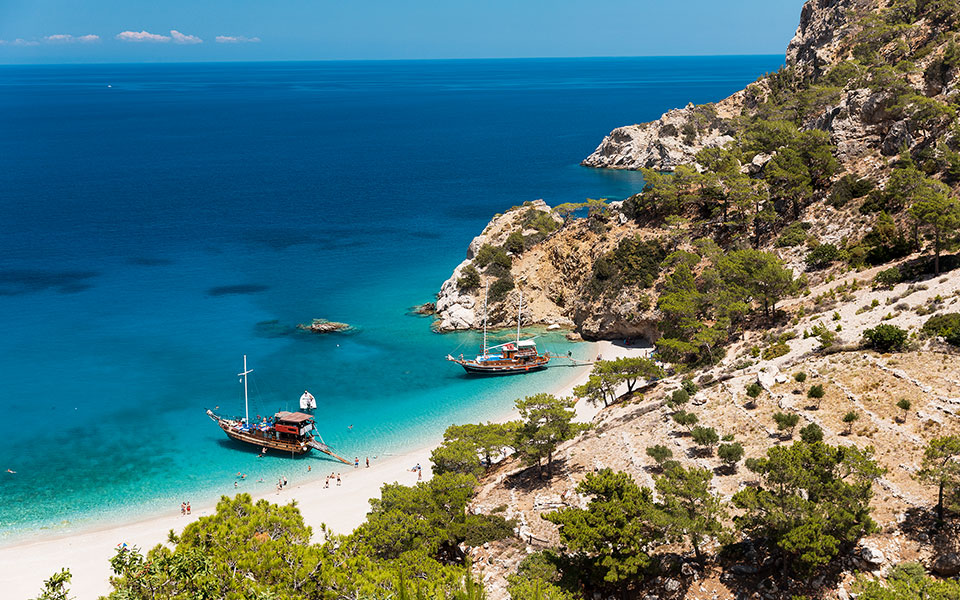
© Nicholas Mastoras
WINDSURF FOREVER: Between May and mid-October, more than 1,000 windsurfers come from all over the world to Afiartis. According to your skill level, you can choose one of three bays: Chicken Bay (for beginners), Gun Bay (intermediate) or Devil’s Bay, if you enjoy the thrill of a 45-knot Etesian wind. There are three schools in operation for lessons or equipment hire. At 20:00 every Sunday, surfers hold a barbeque party at the ION Club Karpathos (Tel. +30 22450.910.61).
SCUBA DIVING: With an underwater visibility range of 30m, Karpathos is considered one of the best scuba diving spots in Europe. You can expect underwater labyrinths, walls, caves and shipwrecks, encounters with sea turtles, and, if you are lucky, seals. It’s an ideal place for a first diving experience under the guidance of the qualified trainers of the PADI-certified Karpathos Diving Center (Tel. +30 22450.228.60).
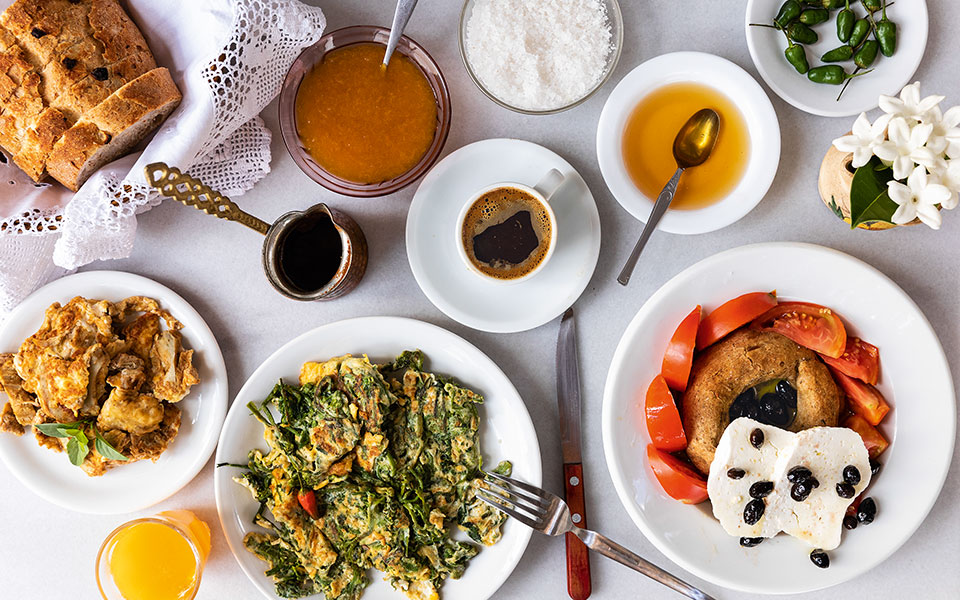
© Nicholas Mastoras
TASTE
CHEESE, ANYONE? Manouli, the local goat cheese, is a family affair in Karpathos, and taverna owners each produce their own. There are three types: fresh manouli, which is creamy (and difficult to find in the summer), hard manouli in brine, and lightly salted manouli that has been sun-dried and dipped in olive oil.
SNACKS AND ENERGY BOOSTS: At Marina’s Restaurant in the fishing village of Finiki, Marina, who lived in Florida for 10 years, serves authentic American breakfast with waffles, hand-cut griddle-fried hash browns and eggs. Another great breakfast place is the En Plo Café-Bar in Pigadia, serving fresh blackberry juice and enormous pancakes. For a local-style brunch with homemade jams and omelets made with crunchy artichoke or tsimetes (wild asparagus) and manouli cheese, all washed down with a cup of local mountain tea, look for Elias’ kafeneio in Menetes, open from 13:00 onwards – they will, however, open earlier if you call them (Tel. +30 6977.342.007). Nearby is the village bakery, which stays open 24 hours. In the morning, you’ll see local women kneading dough for onion biscuits and five different types of bread. Buy a piece of baklava and enjoy it on the Instagrammable white-and-blue village steps nearby.

© Nicholas Mastoras
RESTAURANTS: At Milos Taverna, in Olympos, you can look inside a working 300-year old windmill, one of the 80 windmills and watermills that used to operate in the village until about 1950. Take a seat in the courtyard for moussaka, wild greens pie baked in a wood-burning oven, and kid goat in tomato sauce. In the village of Spoa, the Folia Taverna operates its own small fishing boat “Aghios Georgios.” Join the locals for fresh fish and other local seafood specialties, including thrapsala (flying squid) and oven-baked parrotfish.
On Adeia Beach, Evdoxia’s Taverna is famous for its makarounes, a type of pasta served with sautéed onions and goat’s butter. At the end of your meal, the house will treat you to a shot of a rustic local wine as a digestive.
In Pigadia, the lively port of Karpathos, you’ll find The Life of Angels, a charming traditional eatery in operation since 1921. Its specialty is lamb, slow-cooked for seven hours in a clay pot, and on Sunday nights there is live music featuring a lyra player. Another good option is Orea Karpathos, where you can savor the local tiny shrimp and the house specialty, menoules, a type of small, salted fish. At Uno Pizzeria and at Bella Karpathos, you can taste a local variation on the chicken burger, with homemade bread, grilled chicken, lettuce, tomato, cheese, mayonnaise and a vinaigrette sauce, named the UFO because of its shape.
In Menetes, Perdika is popular with locals and visitors alike, who come here for the juicy grilled meats, the classic Greek dishes and some less usual fare, including snails in a flavorsome tomato sauce. Close to Damatria Beach, you’ll find Poseidon Restaurant. In its beautiful courtyard you can enjoy dishes prepared with fresh local produce and international flair, such as caprese salad with manouli cheese and fish tacos with bonito tuna. It boasts the biggest wine list on the island with 65 selections, all of them Greek. For a truly authentic Karpathos experience, head to the family-owned Aghios Theodoros Taverna, a few meters above the beach of the same name. The establishment is powered entirely by two wind generators, and photovoltaic panels. Before you tuck into its fine, homestyle dishes, go for a swim at the beach below. On Sunday mornings, you’ll see Stasoula, the grandmother, kneading savory makarounes, while her grandchildren play in the courtyard.

